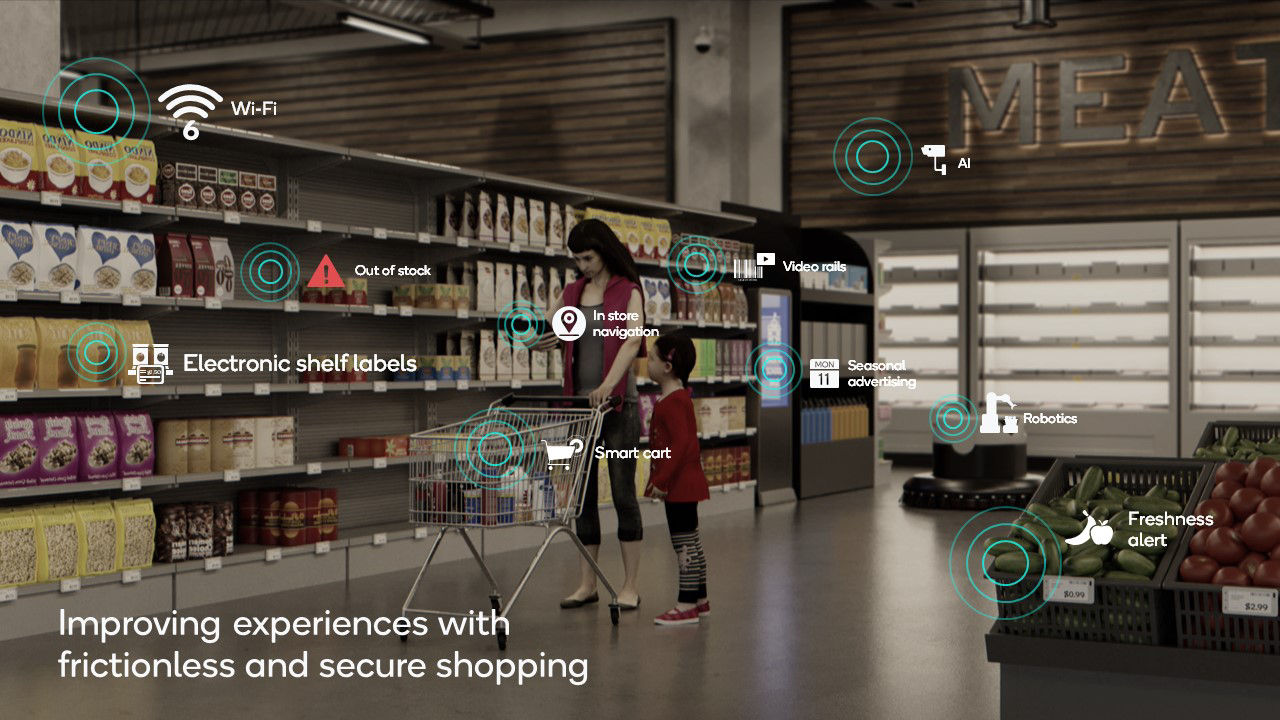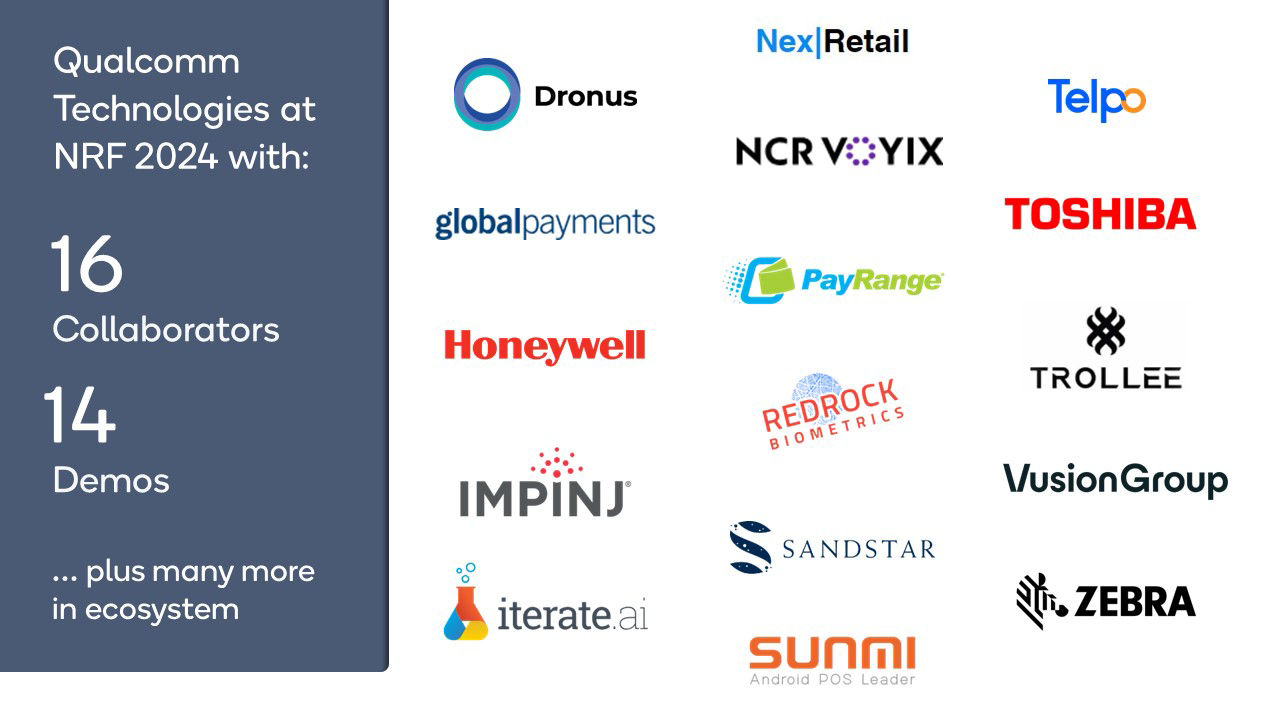This blog post was originally published at Qualcomm’s website. It is reprinted here with the permission of Qualcomm.
NRF 2024 — Retail’s Big Show — is just a few days away as I write these words, and Qualcomm Technologies, Inc., alongside our customers, are excited to demonstrate how we are bringing to life digital retail experiences with commercially available solutions based on Qualcomm processors. Last year, the breakthroughs in generative artificial intelligence (AI) were monumentally exciting. Aware of its vast potential for several years, we at Qualcomm have made it so that AI is holistically engineered into our innovations. This year, in-store and online shopping are expected to remain equally popular. As physical retail regains momentum, we see an opportunity to fulfill consumers’ expectations by enabling seamless and integrated in-store experiences.
From AI and retail analytics, to biometric payments and frictionless shopping solutions, we demonstrate a variety of use cases enabled by our leading on-device AI capabilities, low-power compute, security and connectivity technologies. These demonstrations show how the retail environment is transforming to be increasingly security-focused, efficient and beneficial to the customer journey. At our booth this year, you’ll see how Qualcomm Technologies’ on-device generative AI capabilities are transforming retail and providing real results through:
- Generating insights for retailers’ decision-making,
- Boosting loss prevention to address the industry’s $112B “retail shrink” problem,
- Automating manual tasks to augment the workforce and minimize error rates, and
- Enhancing overall customer experience as consumers increasingly return to in-person shopping.
Plus, our ecosystem of top-notch customers and collaborators are making these transformations a reality. Their products address many of the primary challenges retailers face in areas such as frictionless checkout, loss prevention, inventory management and operational analytics, while also enhancing the all-around shopper’s journey. Read on for a preview of what’s in store at our exhibition at NRF.
Your personal shopping assistant powered by generative AI
Imagine, if you will, getting off a busy workday — you haven’t even begun to think about what’s for dinner. Instead of contemplating over what to make and defaulting to a drive-thru, generative AI helps you decide, becoming your personal shopping assistant. Knowing that Italian is your favorite cuisine, for example, your AI assistant recommends a quick and easy bolognaise recipe, provides a custom shopping list that includes exactly what items you’ll need, and even tells you where in the store to find them.
When you’re in the store, you might be asking for alternative ingredients or other complex questions. In-store interactive AI customer service kiosks provide customers with the answers they’re looking for, while helping retailers learn more about their customers to better serve them in the future. The Qualcomm QCS8550 Processor is the technology we’ve created to help collaborators like NexRetail make these experiences happen.
Digitizing the in-store experience from the shelves to point-of-sale (POS)
Both consumers and retailers are in for a whole new world of seamless shopping experiences.
To digitize consumer intent, you first need to digitalize the physical experience in a store. Digital shelf systems can tell shoppers precisely where in the store they can find their items, while simultaneously keeping inventory for associates and retailers when items are taken off the shelf. To make these tech-forward features and more come to life, collaborators like SESimagotag VusionGroup came to us for our Qualcomm Ultra-Low Power Bluetooth Low Energy System-on-Chip (SoC).
To empower the front-line workers with quick product knowledge, Zebra Technologies is using its proven TC5x mobile computers powered by the AI-enabled Qualcomm QCS6490 Processor to showcase AI assisted in-store product comparison capabilities to help any store associate and consumer to quickly compare and choose products.
Unattended shopping with biometrics payments
The QCS6490 and Qualcomm QCM6125 were also the processors of choice for a collaboration between Global Payments, Redrock Biometrics, SandStar and Teplo, who’ve worked together to enable a smart cooler that can detect what products a customer grabs from it, while using palm biometrics to complete the transaction on the spot. It utilizes dynamic computer vision and AI technology in a connected smart kiosk for a purely unattended shopping experience and smart operational management.
Also, with the QCS6490, Sunmi enables multi-OS support for Windows and Android on one POS terminal design capable of supporting many AI use cases, such as product recognition, biometrics and voice user interface (UI). And using the QCS8550, Iterate.AI enables a frictionless quick-service restaurant, making it so customers can quickly and conveniently get their food orders with voice and license plate recognition. Whether in the grocery store or at the drive-thru, almost 70% of customers will exit a line before it’s even their turn.1 But with these collaborations, retailers and restaurants will hope to serve everyone who enters the parking lot.
AI for frictionless check-out, loss prevention, inventory tracking and more
Increasing and easing the flow of customers, while also keeping track of inventory and loss prevention is another area where AI can help retailers’ overall operational efficiency. In 2022, retailers lost over $112B due to “retail shrink,” or a loss of inventory.2 Now, retailers can look to prevent such losses by using the Toshiba Global Commerce Solutions’ ELERA Security Suite System built on the Qualcomm QRB5165 SoC, which wields advanced Edge AI and computer vision cameras that can respond to incidents, and even differentiate customers’ personal effects from unpurchased store items. Ultimately, this system can help to reduce the retailers’ loss and improve shopper experiences.
Meanwhile, in the back of a store or in a warehouse environment, generative AI at the edge assists workers with diagnostics and repairs. Powered by QCS8550’s powerful AI capabilities and in collaboration with Honeywell, AI assists workers by automating manual tasks of troubleshooting and resolving issues that arise with mechanical processes.
Qualcomm Technologies’ demos at NRF 2024
This was just a peek into what we’ve been helping our retail and IoT collaborators bring into the industry through generative AI, superior connectivity and low-power, high-performance computing. To see first-hand all 14 interactive demonstrations of these commercially available solutions in action, be sure to stop by our booth, #6729. See you in New York!
Art Miller
VP, Business Development and Global Head of Retail IoT, Qualcomm Technologies, Inc.
References:
- Waitwhile (June 28, 2022). Consumer Survey: The State of Waiting in Line (2022). Retrieved on December 15, 2023 from https://waitwhile.com/blog/consumer-survey-waiting-in-line/.
- National Retail Federation. (September 26, 2023). National Retail Security Survey 2023. Retrieved December 15, 2023 from https://cdn.nrf.com/sites/default/files/2023-09/NRF_National_Retail_Security_Survey_2023.pdf.




